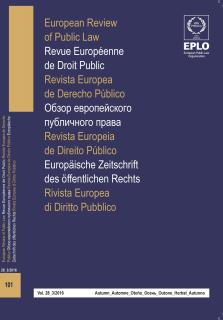
Univ.-Prof. Dr., Institut für Österreichisches und Europäisches Öffentliches Recht, Wirtschaftsuniversität Wien, email: harald.eberhard@wu.ac.at
Since the last chronicle in this series (ERPL/REDP, vol. 26, no 3, 2014, 1165) the Austrian constitutional law has remained very lively. The amendments concerned the parliamentary control rights as well as the jurisdiction of the Constitutional Court: the instrument of parliamentary committees of enquiry was fundamentally reformed and the “Parteiantrag auf Normenkontrolle” (“party’s request for legal review”) was entered into force. This new legal innovation enables any party to proceedings before a court of civil law, on the occasion of an appeal against the first-instance decision, to file with the Constitutional Court for the repeal of the legal provisions applied in the respective proceedings. The repeal of the Federal President final ballot which entailed important statements about the election jurisdiction was one of the spectacular judgments of the Austrian Constitutional Court in 2016 and triggered both political and constitutional discussions.
Depuis la dernière chronique parue dans cette revue (ERPL/REDP, vol. 26, no 3, 2014, p. 1165), le droit constitutionnel autrichien est resté très vivant. Les amendements ont concerné les droits de contrôle parlementaire et la compétence de la Cour constitutionnelle: l’instrument des commissions parlementaires d’enquête a été profondément réformé et le “Parteiantrag auf Normenkontrolle” (demande des parties concernant le contrôle légal) est entré en vigueur. Cette innovation juridique permet à toute partie à une procédure devant une cour civile, à l’occasion d’un appel contre une décision rendue en premier ressort, d’introduire devant la Cour constitutionnelle un recours en vue de l’abrogation des dispositions légales appliquées dans la procédure. L’annulation de l’élection du président fédéral, qui a entraîné d’importantes déclarations concernant la compétence électorale, a été l’un des arrêts les plus spectaculaires de la Cour constitutionnelle autrichienne en 2016 et a suscité des discussions politiques et constitutionnelles.
Seit dem letzten Beitrag in dieser Reihe (ERPL/REDP, vol. 26, no 3, 2014, 1165) blieb das österreichische Verfassungsrecht weiterhin sehr lebendig. Änderungen betrafen vor allem die parlamentarischen Kontrollrechte sowie die Zuständigkeiten des VfGH: Grundlegend reformiert wurde das Instrument der parlamentarischen Untersuchungsausschüsse und neu eingeführt wurde der “Parteiantrag auf Normenkontrolle”, der es Parteien eines erstinstanzlichen Verfahrens vor einem ordentlichen Gericht ermöglicht, direkt den VfGH anzurufen und die Prüfung von Gesetzen und Verordnungen zu erreichen. Das spektakulärste politische wie verfassungsrechtliche Ereignis des Jahres 2016 war die Aufhebung der Bundespräsidentenstichwahl, die grundlegende Aussagen zur Wahlgerichtsbarkeit mit sich gebracht hat.





















